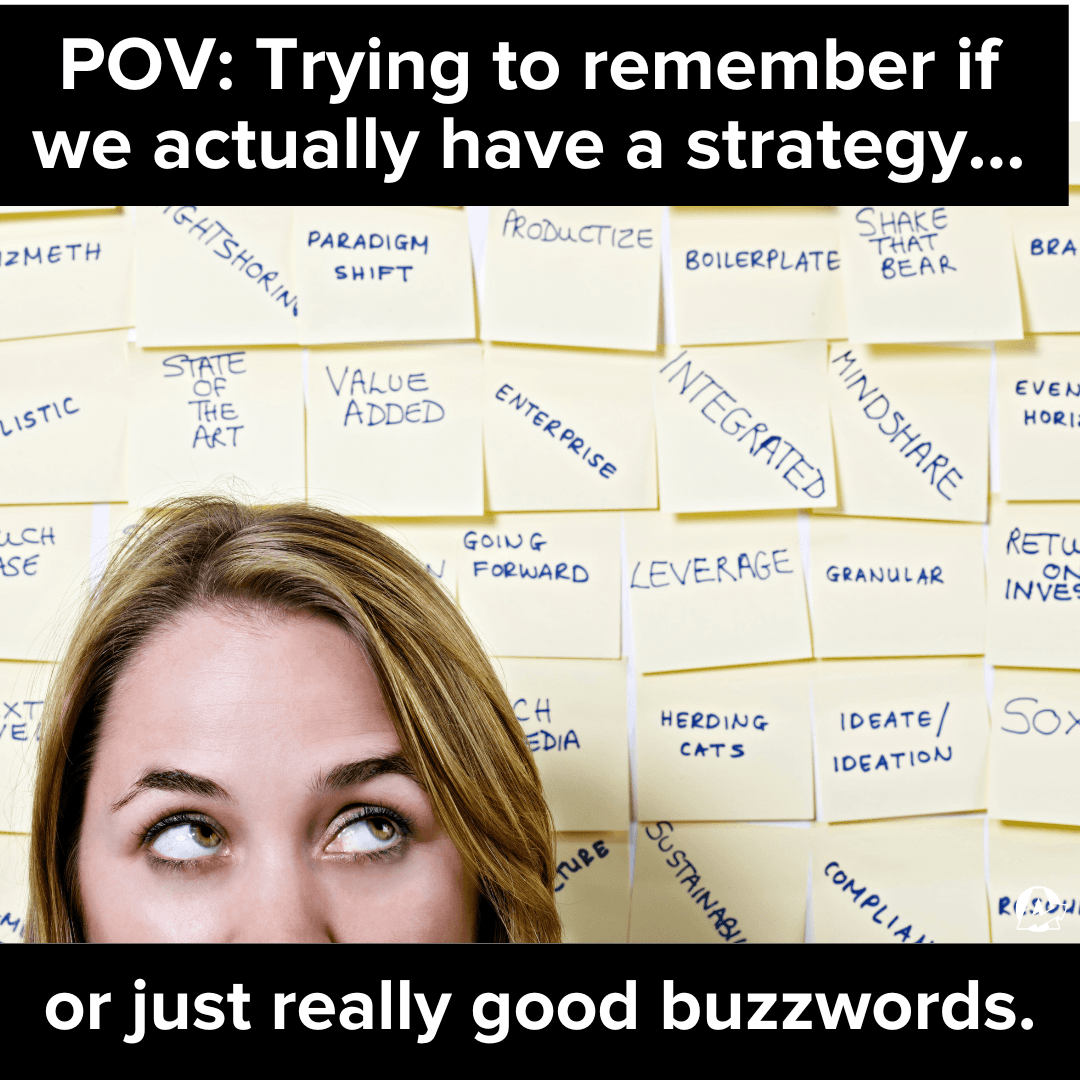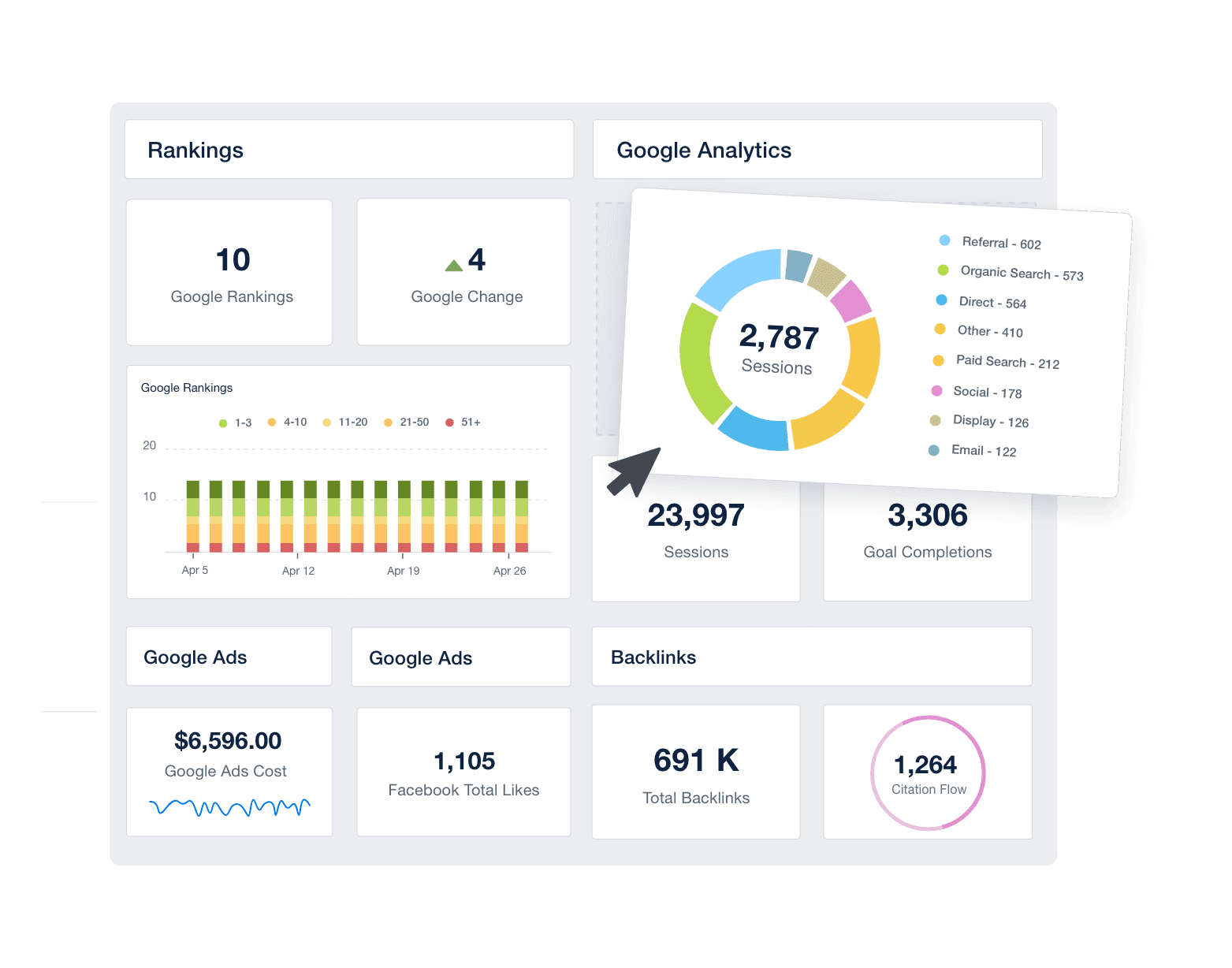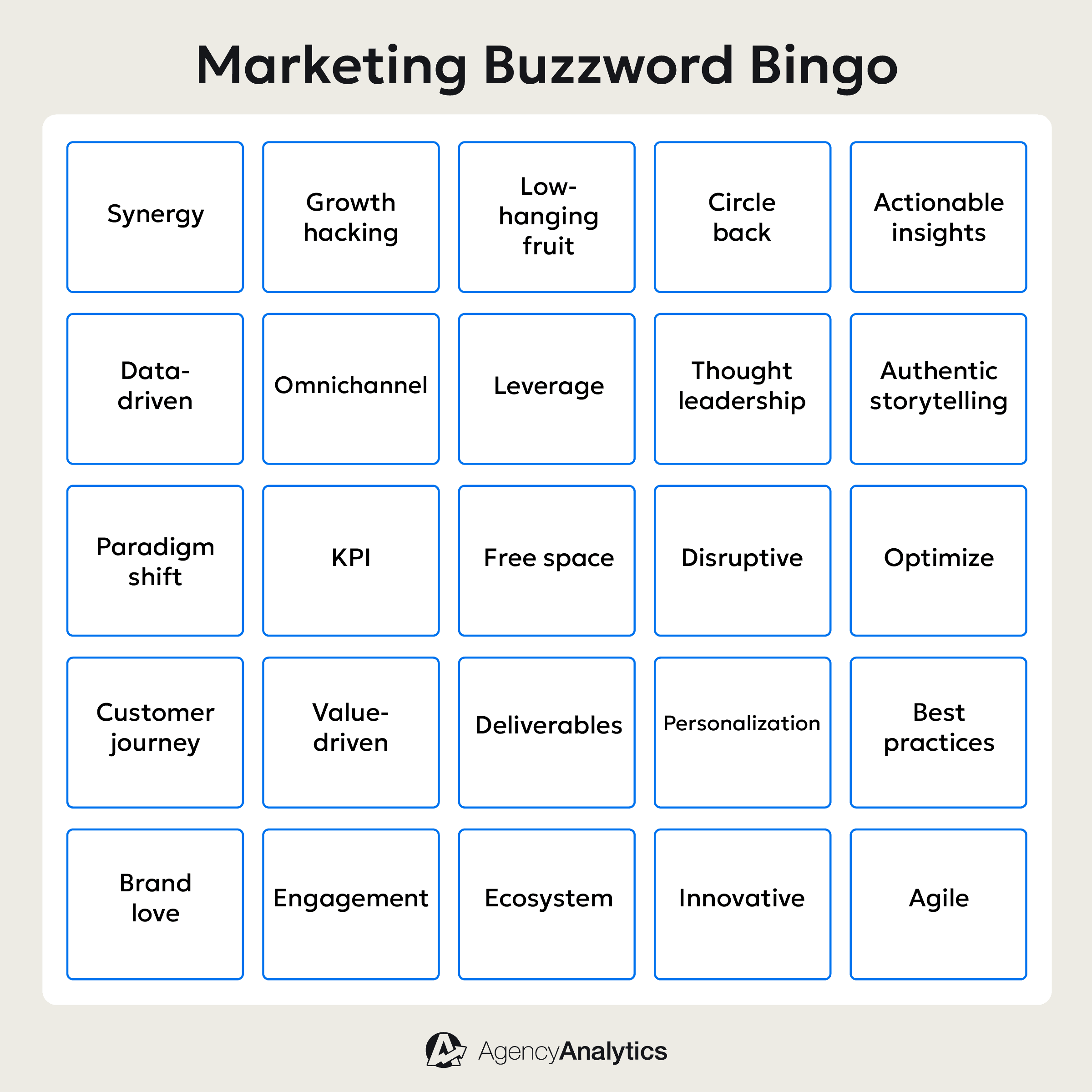Table of Contents
QUICK SUMMARY:
From “omnichannel synergy” to “growth hacking,” we break down what these overused marketing buzzwords really mean, why marketers keep using them, and how they quietly erode clarity and trust. You’ll find light-hearted examples and practical alternatives that make your marketing strategy sound smarter—not buzzier.
Marketers love a good buzzword. We “synergize,” we “ideate,” we “leverage data to unlock growth.” Somewhere between the brainstorming session and the client presentation, we start sounding less like people and more like PowerPoint decks come to life.
Of course, most of these phrases started out with good intentions. “Storytelling” was once a genuine reminder to make campaigns feel human. “Authenticity” meant showing up as a brand that actually cares. But after years of overuse, these words have lost their meaning—like a song you’ve heard one too many times on the radio.
The problem isn’t that buzzwords exist. It’s that they’ve become a shortcut—a way to sound insightful without actually being clear. When every campaign claims to be “data-driven,” “disruptive,” and “innovative,” it all blends into a beige blur of marketing noise.
Clarity, on the other hand, never goes out of style. Clients don’t want to decode a jumble of jargon; they just want to understand what you do and why it matters. So this isn’t a hit list designed to shame your vocabulary (well, not entirely). It’s a guide to saying what you really mean—and sounding smarter while you do it.
Why buzzwords persist in marketing
If marketers had a swear jar for every time someone said “synergy,” most agencies could fund their next company event from loose change alone. Yet, despite all the eye rolls, buzzwords continue to thrive in marketing meetings, proposals, and pitch decks. Why? Because they work—at least, in theory.
They make us sound like we know what we’re doing
Marketing is an industry built on perception, and buzzwords are the linguistic equivalent of wearing a blazer to a Zoom call. Words like “optimization,” “framework,” “playbook,” and “activation” sound strategic and smart—even if they’re just filler for, “We’re still figuring this out.” They help us discuss abstract concepts such as ideas, creativity, and even chaos with confidence.
They save time (until they don’t)
When everyone in the room thinks they know what “data-driven” means, it’s easier to nod along and move on. The trouble is, one person’s “data-driven” is another’s “we looked at Google Analytics once.” Buzzwords become shorthand—useful at first, but dangerous when they replace actual explanation.
They make ideas feel bigger than they are
No one wants to tell a client, “We’ll write a few blog posts and see how it goes.” It sounds so… plain. Instead, we say, “We’re executing a multi-channel content strategy to boost engagement.” It feels more impressive—even if the plan is still a handful of articles and a few tweets.

They spread through osmosis
Let’s be honest: marketers are magpies for shiny new language. Once a buzzword takes off, it’s everywhere. Suddenly, every brand is “authentic,” every app “disrupts the industry,” and every intern knows how to “leverage AI.” Buzzwords spread not because they’re useful, but because they sound like everyone else—and nobody wants to be the only one not “pivoting.”
They hide the hard stuff
It’s much easier to say “optimizing the funnel” than to admit “We’re struggling to convert leads.” Buzzwords give us cover — a way to sound in control when things are messy behind the scenes. They create the illusion of progress, even when what’s really needed is honesty.
The truth is, buzzwords persist because they’re comfortable. Like slang and acronyms, they make us feel like insiders, part of a language only marketers understand. However, that insider talk comes with a cost—one we’ll examine in the next section, where we explore the impact of those words on trust, clarity, and client relationships.
Lost in translation: How buzzwords sabotage clarity
If marketing buzzwords were harmless, we’d let them live their overused little lives in peace. But they come with a price — one that most marketers don’t realize they’re paying. Every time we dress up a simple idea in fancy language, we chip away at something much more valuable: credibility.
They make smart ideas sound hollow
When everyone uses the same words, they stop meaning anything. “Data-driven,” “innovative,” and “customer-first” once carried weight—now they’re background noise. Even strong ideas lose their punch when they’re wrapped in the same buzzword salad as everyone else’s. What was meant to inspire ends up sounding like the copy on a motivational poster.
They create distance instead of connection
Buzzwords are supposed to make us sound relatable and informed. Ironically, they do the opposite. Clients hear “omnichannel alignment” and think, “Okay, but what are you actually going to do?” Overly polished language can feel like smoke and mirrors—and clients notice.
As Kate Thompson, Digital Strategist at Squidgy, puts it:
We find that all agencies like to say that they’re transparent, it is a buzzword, but this shows we don’t hide behind anything or try to manipulate the numbers. What you see is what you get.
Honesty is the antidote to jargon fatigue. It’s not about sounding sophisticated—it’s about being clear.
They confuse the people who matter most
There’s a lot of data in digital marketing, but not every client has the time (or desire) to interpret it. As Brendan Chard, Owner of The Modern Firm, points out:
Clients are busy, juggling many things and often don’t understand the jargon or technicals of the digital marketing world. Make reports clear and to the point so they can easily see how you’re unquestionably helping their bottom line.
Every unnecessary buzzword adds one more barrier between you and your client’s understanding. Clarity makes results feel real—not rehearsed.
They make agencies sound interchangeable
If you’ve ever scrolled through three different agency websites and struggled to tell them apart, you’ve seen the problem firsthand. Everyone “partners for growth.” When every message sounds the same, no one stands out. Buzzwords flatten your brand voice until it could belong to anyone.
They erode internal communication, too
Buzzwords don’t clarify anything—they just spread confusion evenly across the room. “Let’s align on a holistic strategy for scalable growth” could mean ten different things to ten different people. As Nathan Harding, Founder of Yo Media, says:
We make sure that we demystify the process for our clients. We don’t have secrets, there is no ‘smoke and mirrors’ or unnecessary jargon.
That philosophy works internally, too. Clear communication keeps teams moving in the same direction, eliminating the need for endless decoding sessions.
They make real transparency harder
Perhaps the biggest irony of all is how often buzzwords hide behind the word “transparent.” When “transparency” becomes a tagline instead of a practice, it loses its power. True transparency means explaining things simply—even when they’re not glamorous.
By the time a word becomes a buzzword, it’s usually traded meaning for noise. And, along the way, trust and clarity disappear too.
The good news? Marketers are also writers, storytellers, and communicators, and we can do better.
The most overused buzzwords in marketing, what they “mean,” and what to say instead
Now that we’ve confessed our collective love affair with jargon, it’s time to name names. Marketers have turned certain words into a kind of professional background noise. We say them in client meetings, type them into decks, and sprinkle them across landing pages like confetti, convinced they make us sound credible.
Below, we’ve grouped the most overused marketing buzzwords by category—from strategy cliches to social media fluff. Each one comes with a quick (and often tongue-in-cheek) translation and a simple alternative that actually means something. Think of it as a detox for your marketing vocabulary.
Fair warning: You’ll probably recognize a few of your own go-to phrases in here. That’s okay, we’ve all been there. The goal isn’t to feel guilty about using buzzwords; it’s to start noticing when they’re getting in the way of clear, authentic communication.
Marketing strategy buzzwords
Marketers love a good strategy meeting. Mainly because it allows us to discuss things that don’t exist yet. It’s where big words like “alignment” and “innovation” are born, usually on a whiteboard covered in arrows pointing nowhere.
Buzzword | What it really means | What to say instead |
|---|---|---|
Synergy | We hope the two teams can work together without hating each other. | “We’ll collaborate closely to make this work.” |
Alignment | We think we all agree, but we haven’t actually checked. | “Let’s make sure we’re all clear on the next step.” |
Disruption | We’d like to sound like a tech startup, even if we sell Shopify website templates. | “We’re trying a new approach that challenges the norm.” |
Value-add | Something vaguely extra we can’t define but sounds impressive. | “Here’s how this directly benefits your business.” |
Paradigm shift | A dramatic way of saying, “We’re changing stuff.” | “We’re rethinking how we approach this.” |
Big data | Data. But… bigger. | “We’re using large datasets to spot trends and make better decisions.” |
Hyperlocal marketing | “We targeted within a two-mile radius and felt powerful.” | “We’re customizing campaigns to specific local audiences.” |
Innovative | Everyone else is doing it, but we’re pretending we did it first. | “We’ve developed a new idea that solves this specific problem.” |
Clear language doesn’t make you sound smaller; it makes you sound confident. A marketing strategy shouldn’t rely on theatrics; it should depend on plain words that people can actually act on.
Content marketing buzzwords
Content marketers are storytellers—or at least, that’s what we keep telling ourselves. Somewhere between “creating value” and “driving engagement,” we started describing blog posts like Oscar contenders and social captions like works of art. The irony? The more we talk about “authentic storytelling,” the less authentic it sounds.
Buzzword | What it really means | What to say instead |
|---|---|---|
Storytelling | We’re adding a narrative because it sounds strategic, not because we have one. | “We’re sharing an example that shows how this works in real life.” |
Authentic | Forced sincerity in marketing content that usually involves stock photos of smiling people. | “We’re being straightforward about who we are and what we do.” |
Thought leadership | Writing about a topic that’s been covered a thousand times—with your logo on top. | “We’re sharing our experience to help others solve this specific problem.” |
Engagement | Likes, comments, or clicks—basically anything that proves someone noticed. | “We want readers to respond, share, or take action.” |
Going viral | We have unrealistic expectations for this post. | “We’re aiming for content people will genuinely want to share.” |
Snackable content | Small pieces of content we hope someone reads between scrolling and scrolling some more. | “Short, useful content people can absorb quickly.” |
The best content marketing isn’t about sounding profound—it’s about being relatable and helpful. Readers often don’t care whether your brand is “authentic.” They care whether it’s interesting and valuable.
Customer relationship management buzzwords
If you’ve ever sat in a meeting about “deepening relationships through scalable personalization,” you’ve probably felt the quiet panic of realizing no one actually knows what that means. In the world of customer relationship management (CRM), buzzwords thrive because they sound empathetic—even when they’re powered entirely by automation.
Buzzword | What it really means | What to say instead |
|---|---|---|
Customer-centric | We put the customer at the center of everything… at least in our slide decks. | “We design every decision around what’s best for our customers.” |
Delight | We sent an automated email and hope it made someone smile. | “We’re making the experience more enjoyable or more convenient.” |
Personalization at scale | We changed the first name in the email subject line. | “We’re tailoring messages based on real customer behavior.” |
Relationship-first | We’re trying to sound human while using the same outreach template as everyone else. | “We’re focused on long-term trust, not quick wins.” |
360 view of the customer | A dashboard so complicated that no one wants to open it. | “We’re connecting data from different tools to understand the full customer journey.” |
Customer obsession | We say “customer” a lot in meetings. | “We consistently ask customers for feedback and act on it.” |
Marketing automation is helpful—but a genuine connection still wins. As much as we like to talk about “customer journeys,” most people want straightforward communication, honest reporting, and brands that don’t treat them like data points.
Social media marketing buzzwords
Social media is where marketing buzzwords truly hit their stride. It’s the land of “authentic communities,” “relatable brands,” and “always-on engagement,” which usually means posting memes at 10 p.m. and calling it “brand voice optimization.” Every platform has its own lingo, but the result is the same: a stream of content that sounds alive but often says nothing at all.
Buzzword | What it really means | What to say instead |
|---|---|---|
Community building | We hope people comment on our posts without being paid to do so. | “We’re encouraging real conversations with our audience.” |
Brand love | Someone once tweeted something nice about us. | “We’re focusing on positive brand sentiment and loyalty.” |
Relatable | We used lowercase letters and a meme. | “We’re using a tone that matches how our audience actually talks.” |
Snackable socials | We made something short and called it a strategy. | “We’re creating bite-sized content that delivers quick value.” |
Always-on presence | We post a lot because the algorithm told us to. | “We’re staying active and consistent where our audience spends time.” |
Viral moment | We got lucky once. | “We created content designed to spark conversation and sharing.” |
The irony is that the best social media marketing doesn’t rely on buzzwords at all; it sounds like something an actual human might say. Forget “brand authenticity.” Try human consistency.
Mobile optimization buzzwords
Somewhere around 2014, “mobile optimization” became the holy grail of marketing, and we’ve been chasing it with buzzwords ever since. Every website, app, and email campaign now promises a “seamless, frictionless experience,” which usually means we tested it once on someone’s iPhone and called it a day.
Buzzword | What it really means | What to say instead |
|---|---|---|
Seamless experience | We hope nothing breaks when you click around. | “We’ve made it simple to navigate on any device.” |
Responsive design | It doesn’t look terrible on mobile anymore. | “The layout automatically adjusts to fit the user’s screen.” |
Frictionless journey | We’d like you to think this checkout process won’t make you rage-quit. | “We’re removing extra steps to make it faster to complete.” |
Mobile-first mindset | We remembered that people use phones. | “We’re prioritizing design and content for mobile users.” |
Device-agnostic | A fancy way to say “works on everything.” | “It performs consistently across different devices.” |
Optimized experience | We ran a PageSpeed test once. | “We’ve improved performance so pages load quickly and look great on mobile devices.” |
Mobile optimization isn’t about inventing new terms; it’s about making sure people can actually use what you’ve built. When the experience works, no one needs to call it “frictionless.” They’ll just call it easy.
Marketing campaigns buzzwords
Every campaign needs a strong concept, a clear message, and at least three buzzwords to make it sound like it belongs in a Super Bowl ad pitch. “Agile,” and “360 campaign” are the greatest hits—phrases that sound strategic but often mean, “We’re still making this up as we go.”
Buzzword | What it really means | What to say instead |
|---|---|---|
360 campaign | We’re doing a few things on different channels and hoping it feels connected. | “We’re coordinating messaging across every platform we use.” |
Full-funnel strategy | We made a chart once that had a funnel on it. | “We’re targeting people at each stage—awareness, consideration, and conversion.” |
Data-driven | We have access to Google Analytics. | “We’re making decisions based on actual results, not assumptions.” |
Agile marketing | We change our minds… a lot. | “We’re testing and adjusting quickly based on performance.” |
Activation | We launched something and want it to sound fancy. | “We kicked off this campaign or event.” |
Test and learn | We didn’t plan this far ahead. | “We’re experimenting to find out what works before scaling.” |
The best campaigns don’t need to brag about being “data-driven” or “360.” If they actually deliver results, the data—and the impact—speak for themselves.
Speaking of delivering results, our proprietary, next-gen, full-funnel synergy solution leverages data-driven insights to supercharge your omnichannel performance while optimizing engagement across every touchpoint in the customer journey.

In other words, build custom marketing dashboards that actually make sense in minutes instead of hours.
Search engine optimization buzzwords
Search engine marketing is where strategy meets science, and buzzwords multiply like backlinks. Between “intent optimization,” “keyword ecosystems,” and “SERP domination,” SEM can start to sound like a secret society where everyone’s pretending to understand the same mysterious search engine algorithms.
Buzzword | What it really means | What to say instead |
|---|---|---|
Optimize for intent | We’re guessing what people might be searching for. | “We’re matching our content to what users actually want to find.” |
Keyword ecosystem | A dramatic way to say “list of keywords.” | “We’re building related keyword groups that support our main topics.” |
SERP domination | We ranked for one keyword once and are riding the high. | “We’re improving visibility for multiple high-value search terms.” |
Search visibility | We showed up somewhere on Google. | “Our pages are appearing higher in search results for our target audience.” |
Organic reach strategy | We’re trying not to pay for ads this month. | “We’re focusing on improving our unpaid search performance.” |
Intent-driven targeting | We’d like this to sound smarter than ‘good keyword match.’ | “We’re tailoring campaigns to user search behavior and goals.” |
Actionable analytics | Pretty charts, unclear takeaways. | “We’re using clear data insights to guide real changes.” |
Good search engine marketing doesn’t need a “visibility framework” or “intent-driven narrative.” It just needs clear goals, useful content, and proof that people are actually finding what you built.
Growth hacking buzzwords
Once upon a time, growth hacking sounded rebellious—like a scrappy alternative to traditional marketing. Now it’s mostly a bingo card of phrases you’ll hear in every startup pitch deck. Everyone’s “failing fast,” “scaling rapidly,” and “optimizing virality,” which usually translates to we’re still figuring out product-market fit, but we made a spreadsheet.
Buzzword | What it really means | What to say instead |
|---|---|---|
Scalable | We think it’ll work for more than five people. | “This process can handle higher volume without breaking.” |
Viral loop | We hope people invite their friends. | “We’re encouraging users to share the product naturally.” |
North star metric | The one number we chose because investors requested it. | “Our main measure of success is X—here’s why it matters.” |
Fail fast | We launched too early, but we’re calling it intentional. | “We’re testing quickly to learn and improve.” |
Hockey stick growth | We had one good month, or we need to have a really good month soon…or we’re in trouble. | “We’ve seen an upward trend and are planning for steady growth.” |
Disruptive innovation | We added AI to something that didn’t really need AI. | “We’re improving on what’s already out there in a meaningful way.” |
The truth is, growth hacking isn’t magic; it’s just clever marketing with a caffeine problem. Sustainable growth doesn’t come from buzzwords; it comes from consistency, iteration, and a little bit of patience (which, sadly, doesn’t sound nearly as exciting in a pitch deck).
Customer lifetime value buzzwords
If there’s one thing marketers love more than new leads, it’s talking about keeping the old ones. Enter the world of customer lifetime value—a place where everyone’s “nurturing loyalty,” “reducing churn,” and “maximizing retention.” Half the time, these buzzwords are code for we’re sending another email campaign and hoping they don’t unsubscribe.
Buzzword | What it really means | What to say instead |
|---|---|---|
Retention optimization | We’re bribing existing customers to stick around. | “We’re improving the experience so people want to stay.” |
Loyalty loop | The same customer, just with a fancy name. | “We’re encouraging repeat business through great service.” |
Churn prevention | We noticed people leaving and are now panicking. | “We’re identifying why customers leave and fixing it.” |
Win-back campaign | The marketing equivalent of a “you up?” text. | “We’re reconnecting with past customers to see how we can help.” |
Customer lifetime value (CLV) | The number we use to justify how much we spent on ads. | “The total revenue we can expect from each customer over time.” |
Reactivation funnel | A series of emails we hope someone opens. | “We’re re-engaging inactive customers with relevant offers.” |
Buzzwords like “retention optimization” make keeping customers sound like rocket science. In reality, people stick around when you communicate clearly, deliver what you promise, and make their lives easier. It’s not a funnel—it’s a relationship.
Marketing strategies buzzwords
This is where the jargon really starts flexing its MBA vocabulary. The land of “ecosystems,” “frameworks,” and “integrated approaches.” These are the phrases that show up in expensive-looking decks with hexagons and arrows going in every direction. Everyone nods along because it sounds strategic, but half the time it’s just a complicated way of saying, “We’re doing a few things that connect.”
Buzzword | What it really means | What to say instead |
|---|---|---|
Omnichannel | We’re using more than one platform and hoping it looks intentional. | “We’re creating a consistent experience across all our channels.” |
Integrated marketing | We added our logo to everything and called it alignment. | “We’re coordinating messages so they reinforce each other.” |
Data-led | We cherry-picked numbers that support our argument and make us look good. | “We’re basing decisions on actual performance results.” |
Multitouch attribution | We’re not entirely sure which ad worked, so we’re giving credit to all of them. | “We’re tracking how different touchpoints contribute to conversions.” |
Ecosystem | A buzzword that mostly means “we have a lot of tools.” | “We’re connecting our tools and channels so they work together.” |
Strategic alignment | Everyone’s pretending to agree on the goal. | “We’ve made sure every team is working toward the same objective.” |
“Marketing strategies” sound impressive in theory, but the real magic happens when you ditch the jargon and get specific. The more clearly you define what’s happening and why, the less you’ll need hexagons to prove it.
Marketing Buzzword Bingo
Let’s be honest: most marketing meetings are one PowerPoint away from a full round of competitive jargon tournaments. So why not make it official? Welcome to Marketing Buzzword Bingo—the game where everyone wins (or loses, depending on how many times someone says “low-hanging fruit”).
Play along in your next brainstorm or client call. Every time you hear one of these, mark your square—bonus points if someone manages to say three in a single sentence.

Impress clients and save hours with custom, automated reporting.
Join 7,000+ agencies that create reports in under 30 minutes per client using AgencyAnalytics. Get started for free. No credit card required.
Already have an account?
Log inFrequently Asked Questions, The Marketing Buzzword Edition
Every marketer has Googled at least one of these at some point—usually after hearing “contextualized marketing funnel” in a meeting and pretending to know what it meant. Consider this your safe space for honest answers, plain language, and zero judgment.
A marketing buzzword usually starts out as a useful idea (like growth hacking or omnichannel strategy) but becomes meaningless after too many LinkedIn posts and webinars. It’s what happens when marketing professionals recycle the same phrases to sound innovative rather than being specific.
The best way to avoid this? Say what you actually mean. Clear explanations consistently outperform trendy language in every form of online marketing, from SEO to social media posts.
Start by questioning every word that feels too big to explain. Replace “value-driven, omnichannel engagement” with “reaching people where they already spend time.” Simplicity isn’t unprofessional; it’s persuasive.
Whether you’re writing ads, planning campaigns, or creating content marketing strategy docs, focus on clarity. Your digital marketing efforts should attract potential customers, not confuse them.
A few have earned their keep. Conversion rate optimization, customer experience, and lead generation all describe real, measurable things—when used correctly. The problem isn’t the words themselves; it’s the lack of context.
A good marketer explains how those ideas drive business growth and attract paying customers, rather than letting the jargon do the talking.
Part habit, part insecurity. Buzzwords make simple ideas sound impressive—which helps when you’re pitching to clients or stakeholders. But most modern consumers prefer plain English.
If your audience can’t tell what you actually do, your marketing tactics aren’t working. Whether you’re running an email marketing campaign, optimizing for search engine results, or building brand identity, the clearest message wins.
AI is the latest shiny object in marketing—and yes, it’s already generating new buzzwords. From predictive analytics to automated social media ad campaigns, artificial intelligence can enhance performance marketing and enable marketers to interpret customer data more efficiently. But it’s still a tool, not a miracle. The smartest use of digital technology is to simplify, not complicate.
And don’t be surprised if AI makes up some buzzwords of its own, like “micro-delightification” (the process of creating tiny, unnecessary moments of joy in a digital experience), “contextualized virality loop” (a theoretical model where user-generated content fuels organic awareness and viral marketing), or “sentiment scaffolding” (the act of supporting brand storytelling with emotional data to build audience trust).
Yes, those are completely made up!
In 2025, expect to hear more about contextual marketing, experiential marketing, and web personalization. Some of these can be powerful marketing techniques—when backed by an actual strategy.
But if you can’t explain how they help customers interact with a brand or increase brand awareness, they’re probably just words on a deck.
Skip the slogans and focus on consistency. Brand loyalty and customer retention don’t come from declaring that you care. They come from reliable service, useful communication, and thoughtful follow-up.
Encourage customers to stay by giving them a genuine reason to do so—not just a buzzword. Real connection builds valuable customer relationships.
Forget “synergy” and “virality.” Focus on numbers that demonstrate impact, such as website visitors, direct marketing response rate, average purchase value, or the percentage of returning customers. If your marketing tools reveal steady improvements in engagement or site visitors, you’re doing something right.
Utilize marketing insights and actionable data to inform your next strategic move.
The best agencies know that fresh doesn’t mean fancy. They use storytelling rooted in data, language their clients understand, and visuals that support their message. Whether it’s content marketing, website traffic, social media platform performance, or pay-per-click marketing, the secret is simple: make complex things feel easy.
That’s what turns potential customers into paying customers—and paying customers into advocates.
Wrapping it up: Clarity is the new creativity
If you’ve made it this far without circling back, aligning synergies, or leveraging any ecosystems, congratulations—you’re already ahead of most marketing meetings.
Buzzwords aren’t evil. They’re just tired. They’re the verbal equivalent of using stock photos in a campaign about “authentic storytelling.” They start as shortcuts for smart ideas and end up as empty placeholders.
But here’s the thing: marketers are better than that. We’re communicators by trade—translators between brands and the humans who buy from them.
When you strip away the jargon, you don’t lose professionalism; you gain precision. You sound confident, not corporate. Real language builds trust, strengthens brand identity, and attracts the kind of loyal, paying customers who don’t need “delightification” to stick around.
So the next time you’re tempted to say “Let’s leverage a best-in-class solution to maximize cross-channel engagement,” take a breath. Then try this instead:
“Let’s make something great—and make sure people actually understand it.”
Because in the end, marketing isn’t about buzzwords. It’s about connection. And connection never goes out of style.

Written by
Paul Stainton is a digital marketing leader with extensive experience creating brand value through digital transformation, eCommerce strategies, brand strategy, and go-to-market execution.
Read more posts by Paul StaintonSee how 7,000+ marketing agencies help clients win
Free 14-day trial. No credit card required.






